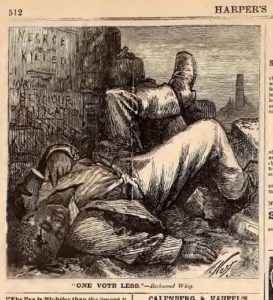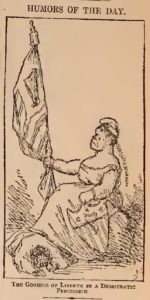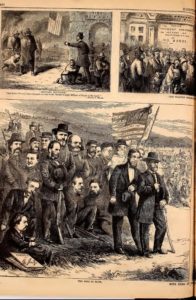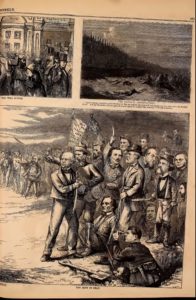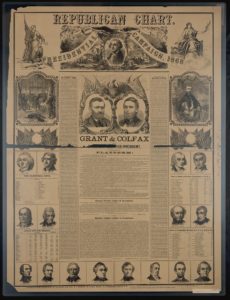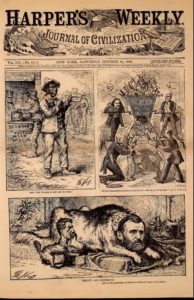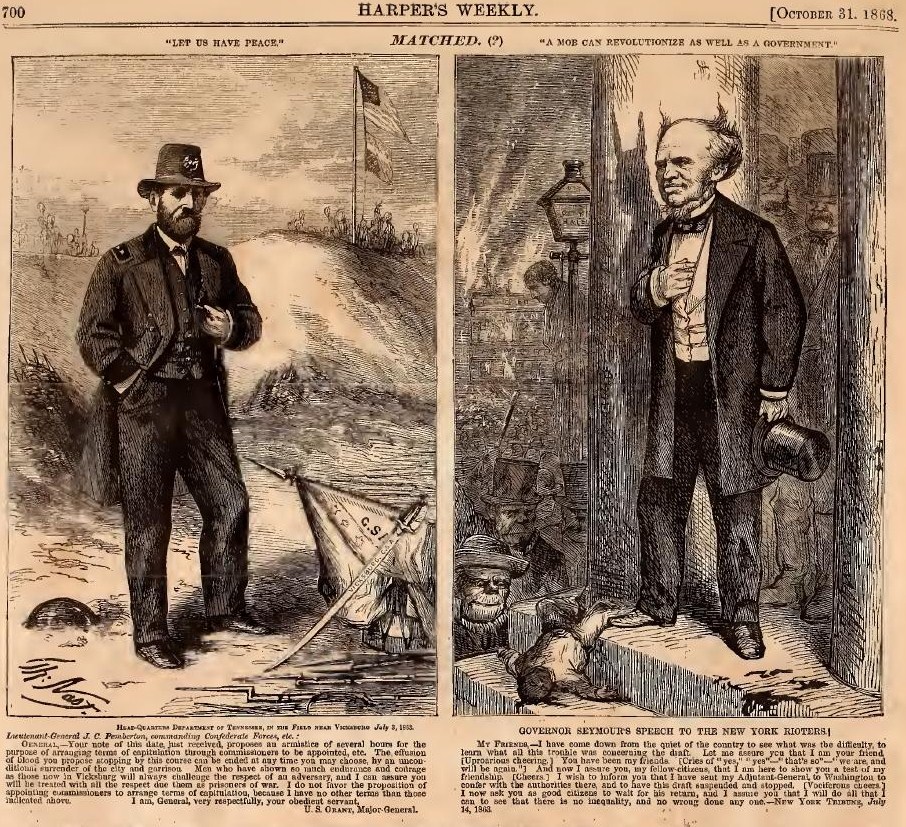150 years ago the presidential election in the United States was to be held on November 3rd. According to documentation at the Library of Congress, sometime during the campaign the Union Republican Congressional Committee published an election guide for the newly freed and enfranchised black men down South. The pamphlet, presented in a question and answer format, explained why the new voters had a “duty” to vote Republican.
THE PARTY OF FREEDOM AND ITS CANDIDATES.The Duty of the Colored Voter.
Published by the Union Republican Congressional Committee, Washington, D. C.
ABRAHAM LINCOLN, THE EMANCIPATOR, Assassinated April 14, 1865.
ULYSSES S. GRANT, HIS SUCCESSOR, Will be elected President November 3, 1868.
The following is a dialogue between a newly-made citizen and a Radical Republican. The new voter is seeking light upon the subject of his political duties; his Radical friend gives him plain facts, and demonstrates clearly with which party all like him should act. It would be well for colored voters generally to seek out some tried Radical and question him upon all subjects about which they have any doubt:
THE DIALOGUE.
Question. With which party should the colored man vote?
Answer. The Union Republican party.
Q. Why should the colored man vote with that party?
A. Because that party made him free and has given him the right to vote.
Q. Was Mr. Lincoln a Republican?
A. He was a Republican President.
Q. Are Republicans in favor of universal freedom?
A. They are. _____________________________
Q. Are the Radicals and Republicans one and the same party?
A. Yes; and they are in favor of freedom and universal justice.
Q. What is the meaning of the word Radical as applied to political parties and politicians?
A. It means one who is in favor of going to the root of things; who is thoroughly in earnest; who desired that slavery should be
abolished, that every disability connected therewith should be
obliterated, not only from national laws but from those of every State in the Union.
Q. To which party do the friends of the colored men in Congress belong?
A. To the Republican Party.
Q. What is a Democrat?
A. A member of that party which before the rebellion sustained every legislative act demanded by the slave-holders, such as the Fugitive Slave Law, and the attempt made to force slavery upon the Western Territories.
Q. Who said that “a negro had no rights that a white man was bound to respect?”
A. Chief Justice Taney, a Democrat.
Q. Was this sentiment approved by the Democracy?
A. It was; and by them only.
Q. Why did the Southern States rebel?
A. Because the Republican party in 1861 elected Abraham Lincoln President, who was opposed to the extension of slavery.
Q. What did they propose to do by rebellion?
A. Establish a government of their own; the corner-stone of which should be human slavery.
Q. Did any leading rebel make such a declaration?
A. Yes; Alexander H. Stephens, of Georgia, in a speech in May, 1861, at Montgomery, Alabama.
Q. What position did Mr. Stephens hold in the rebel Confederacy?
A. He was their Vice President.
Q. What was the position of the Democratic party during the war?
A. It opposed the war; declared Mr. Lincoln’s management of it a failure; resisted every measure in Congress looking to emancipation, and denounced the Government for employing colored men as soldiers.
Q. What has that party done since the surrender of the rebels?
A. It has sustained Mr. Johnson in his efforts to restore your old masters to power in the country, and opposed every act for your benefit which the Republican Congress has adopted.
Q. Would the Democrats make slaves of the colored people again if they could?
A. It is fair to presume that they would, for they have opposed their freedom by every means, have always labored to extend slavery, and would now try to deprive them of the right to vote, which they have always opposed in Congress and in the various State Legislatures.
Q. Who abolished slavery in the District of Columbia?
A. A Republican Congress and Abraham Lincoln, a Republican President.
Q. Who freed the slaves in the South?
A. Abraham Lincoln, the Republican President, by proclamation.
Q. Who made colored men soldiers?
A. The Republican party.
Q. Who opposed this?
A. The Democrats.
__________________
Q. Who refused to recognize colored soldiers as prisoners of war?
A. The rebels.
Q. By whom were they murdered or used as slaves when captured?
A. By the rebel Government.
Q. What party sympathized with the rebel Government?
A. The Democracy.
Q. Who passed the Freedmen’s Bureau bill?
A. A Republican Congress by more than a two-thirds vote over the veto of Andrew Johnson, the leader of the Democratic or Conservative party.
Q. Who gave us the Civil Rights bill?
A. The same Republican Congress.
Q. What party gave us the right to vote?
A. The Republican party, through its majority in Congress.
Q. What has the Democratic, Conservative, or Copperhead party ever done for the colored people?
A. It has tried to keep them in slavery, and opposed giving them the benefit of the Freedmen’s Bureau and Civil Rights bills, and the right to vote.
Q. Why cannot colored men support the Democratic party?
A. Because that party would disfranchise them, and, if possible, return them to slavery, and certainly keep them in an inferior position before the law.
Q. With whom do the disloyal white men of the South desire the colored men to vote?
A. With the Democratic party.
Q. Why do the Democrats pretend to be the best friends of colored men?
A. Because they contend they are of a lower race, and are, therefore, happier in an inferior position, or in slavery.
Q. How would it suit them to be served in the same manner?
A. They would not endure it. They call themselves a superior race of beings, and claim they are born your rulers.
Q. Why do they not do unto others as they would be done by?
A. Because they are devoid of principle, and destitute of all sense of justice where the colored man is concerned.
Q. Do all white persons belong to a party which would treat us in that way?
A. They do not. There are many who have stood up nobly for your rights, and who will aid you to the end; indeed, all true Republicans are such.
Q. Are there any white persons who have always contended for our liberty?
A. Yes; there are many such.
Q. To which party do these tried friends of ours now belong?
A. The Republican party.
Q. To what party do the white people of the South belong?
A. The larger portion belong to the Democratic party.
Q. Are the former slave-holders and leaders of the rebellion members of that party?
A. Most of them are; they would not regard you as having any rights if they were in power.
Q. Colored men should then vote with the Republican or Radical party?
A. They should, and shun the Democratic party as they would the overseer’s lash and the auction block. …
[two more pages, which include the Republican platform]

![The party of freedom and its candidates. The duty of the colored voter. Published by the Union Republican congressional committee, Washington, D. C. Washington, D. C. Printed at the office of the Great Republic [1868]. (LOC: https://www.loc.gov/resource/rbpe.2050260b/)](https://www.bluegrayreview.com/wp-content/uploads/2018/11/colored_duty1-185x300.jpg)
![The party of freedom and its candidates. The duty of the colored voter. Published by the Union Republican congressional committee, Washington, D. C. Washington, D. C. Printed at the office of the Great Republic [1868]. (LOC: https://www.loc.gov/resource/rbpe.2050260b/)](https://www.bluegrayreview.com/wp-content/uploads/2018/11/colored_duty2-150x150.jpg)
![The party of freedom and its candidates. The duty of the colored voter. Published by the Union Republican congressional committee, Washington, D. C. Washington, D. C. Printed at the office of the Great Republic [1868]. AC LOC: https://www.loc.gov/resource/rbpe.2050260b)](https://www.bluegrayreview.com/wp-content/uploads/2018/11/colored_duty3-150x150.jpg)
![The party of freedom and its candidates. The duty of the colored voter. Published by the Union Republican congressional committee, Washington, D. C. Washington, D. C. Printed at the office of the Great Republic [1868]. (LOC: https://www.loc.gov/resource/rbpe.2050260b)](https://www.bluegrayreview.com/wp-content/uploads/2018/11/colored_duty4-150x150.jpg)
